In a bustling city, a teenager named Emily finds solace in her smartphone. As she scrolls through social media, she sees friends enjoying life, attending parties, and showcasing perfect moments. However, beneath the surface of her digital interactions lies a growing sense of isolation and anxiety. This scenario is not unique; it reflects a pervasive issue in our modern world. As technology becomes increasingly integrated into our daily lives, understanding its effects on mental health is crucial.
The Double-Edged Sword of Technology
The digital age offers unprecedented access to information and connectivity, yet it also presents significant mental health challenges. The rise of social media platforms has transformed how we communicate, but this transformation comes with a cost. Studies indicate that heavy social media use correlates with increased anxiety, depression, and feelings of inadequacy among users. The pressure to curate an ideal online persona can lead to unhealthy comparisons and self-esteem issues.
Psychological Stressors in the Digital Landscape
Social Media and Its Effects
Social media serves as a double-edged sword. While it can foster connections and support networks, it often amplifies feelings of loneliness and inadequacy. A 2023 study revealed that nearly half of American teenagers report negative impacts on their mental health due to social media usage. The constant exposure to curated images of others’ lives can lead to feelings of missing out (FOMO) and body image dissatisfaction.Work-Life Balance Disruption
The digital environment has blurred the lines between work and personal life. Remote work and constant connectivity can lead to burnout, as individuals find it challenging to disconnect from their professional responsibilities5. This relentless pressure contributes to heightened stress levels and decreased overall well-being.Digital Dependency
The phenomenon of digital dependency is another pressing concern. Many individuals develop an addiction to their devices, leading to excessive screen time that disrupts sleep patterns and reduces physical activity8. This cycle of dependency often exacerbates existing mental health issues, creating a feedback loop that is difficult to escape.
Understanding Mental Health Disorders in the Digital Context
As technology continues to evolve, so do the psychological disorders associated with its use. Conditions such as internet addiction disorder have emerged as significant concerns. Individuals may find themselves spending excessive amounts of time online at the expense of real-life interactions and responsibilities. This disconnection can lead to profound feelings of loneliness and despair.Moreover, the rise of cyberbullying has added another layer of complexity. Victims often experience anxiety, depression, and even suicidal thoughts as a result of online harassment24. The anonymity afforded by the internet can embolden individuals to engage in harmful behaviors they might avoid in person.
Strategies for Mitigating Digital Stress
To navigate the psychological challenges posed by technology, individuals can adopt several strategies:
- Limit Social Media Use: Setting boundaries on social media engagement can help mitigate feelings of inadequacy and anxiety. Designating specific times for checking social media can reduce impulsive scrolling.
- Cultivate Face-to-Face Connections: Prioritizing in-person interactions fosters deeper relationships and combats feelings of isolation. Engaging in community activities or hobbies can provide meaningful social connections.
- Practice Digital Detoxes: Regular breaks from technology can help restore balance. Engaging in activities that do not involve screens—such as reading or outdoor exercise—can improve mental clarity and emotional well-being.
- Seek Professional Help: For those struggling with severe mental health issues related to technology use, professional counseling or therapy can provide essential support and coping strategies.

Conclusion:
The digital age presents both opportunities and challenges for mental health. While technology facilitates connection and access to information, it also introduces significant risks associated with social media use, work-life imbalance, and digital dependency. By recognizing these challenges and implementing proactive strategies, individuals can better navigate the complexities of modern life.Emily’s story is a reminder that behind every screen lies a human experience filled with emotions—both positive and negative. As we continue to embrace technology, it is vital to prioritize our mental health and foster genuine connections that enrich our lives beyond the digital realm. Through collective awareness and action, we can create a healthier relationship with technology that promotes well-being in an increasingly connected world.


